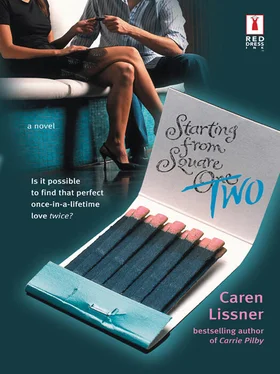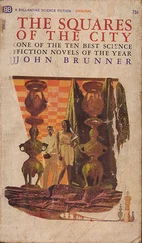He wasn’t trying to get her back to his apartment! And he wanted to see her again. She hadn’t botched the date. What luck!
“Sure,” she said. “That sounds good.”
“Do you want to take a walk before we head home?”
It was bitter cold outside. He took her hand for a second, without thinking, and then let go when they got near the waterfront. “What’s out there?” he asked.
“Water,” Gert said.
He laughed. “I knew you were smart,” he said. “It looks like an island.”
“Long Island?”
“I don’t know.”
There was a bench facing the water, and they sat down. She wondered if he was going to ask The Question. At what point did guys ask women about their ex-boyfriends and past relationships? It didn’t happen on a first date, right? She wasn’t sure.
The women in her support group had talked about this: If you met someone new, at what point did you tell him that your husband had died? For the older women, it wasn’t much of an issue, because their suitors generally figured they were either divorced or widowed and asked about it. But with younger women, it wasn’t expected at all. And Gert had found that when you told someone such news, particularly young people, they often had no idea what to say. Sometimes they just stared at her, stunned. It was almost as if they were waiting for her to comfort them.
But Todd didn’t ask about Gert’s former boyfriends. He asked about her friends, her college, her dreams. He told her that he figured that someday he’d have kids, travel and see the world—not by train—and be a good person so that he’d be satisfied when he got old and looked back on his life. He said what was most important to him was to be with the people he cared about and make them happy.
He was simple, Gert thought. Much simpler than Marc.
But he was the kind of guy, she thought, that someone could fall in love with.
Gert found out Todd was younger than she was—twenty-six. Hallie had a “Rule of Twenty-Seven.” If a guy was still single after twenty-seven, she said, there must be something wrong with him. If he was decent, it was unlikely that he’d even get that far. So once a woman surpassed the age of twenty-seven, she would always be dating guys younger than her.
Todd was Gert’s brother’s age, which she found a little strange. It was like dating one of her brother’s meatheaded friends. But Todd wasn’t anything like her brother. Gert loved her brother, but he could definitely be a meathead sometimes.
They made plans to see a movie the weekend after next. Then Todd gave Gert a quick kiss on the cheek.
She could still smell his cologne and feel the brush of his stubble afterward. She hadn’t realized how much she’d missed that.
“You can’t start dating the first person you meet,” Hallie said.
They were at a dingy coffee shop on the Upper West Side, near Hallie’s apartment.
“Did Brian say anything about me?” Erika asked Gert. “I don’t want to date him…I just want to know why he didn’t like me.”
“I’ll ask the Saturday after next,” Gert said, feeling suddenly tired of Erika. She elected to forget the “big hair” comment.
“But you were supposed to come to a party with us on that Saturday!” Hallie said. “You can’t go out with him that day. Can’t you see Todd on Sunday?”
“He’s working on Sunday,” Gert said. “He’s working for a week straight after that.”
“Now she knows his schedule,” Erika said.
“They’ll have to have their wedding when he’s not on call,” Hallie said.
“They won’t be able to have alcohol at the reception,” Erika said, “because Todd can’t drink.”
“Then I’m not coming,” Hallie said. “How can a single girl get through a friend’s wedding without alcohol?”
“Will you guys stop!” Gert said. “We’re not getting married.”
“You act like it.”
“You know, all the two of you do is complain,” Gert said. “It almost seems like you’re upset that I spent an evening with someone nice.”
There was silence.
“You know we just want you to be happy,” Hallie said.
“Yeah,” Erika said. “We know what guys are like. We don’t want you to get hurt.”
Gert didn’t want that either. But sometimes it hurt to get up in the morning. Whatever was coming couldn’t be much worse.
Every other Christmas, Gert and Marc had stayed with Marc’s parents in their huge warm house in Massachusetts, where all four brothers had grown up. Gert loved that house. It held oodles of guestrooms, a fireplace and long slurpy couches you could fall asleep in. It was in an upscale waterfront hamlet just north of Boston with gaslights on the main streets and shanties near the water. During holidays, relatives practically oozed from the walls: Cousins, nieces and nephews, all asking Gert when she was going to have a baby. She had always said, “Soon.”
Nowadays, she sometimes felt like she had a gaping hole inside of her, ready to be filled with something living. She used to look at Marc and think that she couldn’t wait to see what kind of person would come from them.
This past year, on both Thanksgiving and Christmas, the Healys hadn’t invited her to the house. She and Marc had routinely stayed on the East Coast for one holiday and then gone to her parents’ in L.A. for the other. But now, she hadn’t heard from Marc’s parents in almost five months. She still had their last name. She had been officially part of the family. Yet, suddenly, because of one day, half of her support network was gone.
Going home to L.A. for both holidays had been especially hard. Gert’s brother and his girlfriend were there. Gert was alone. After bluffing her way through dinner, she’d gone up to her childhood bedroom, lay on her mattress surrounded by purple walls and cried.
She remembered the times that Marc had stayed with her there on holidays, how they had both crammed onto her single bed in the room with the stuffed animals and purple walls, and how funny that was. He used to scrounge through her closet to find old diaries and report cards and use them to tease her. “‘Gert’s penmanship has improved slightly, but she needs help following directions,’” Marc read one time in an authoritative voice, linking it to the way she’d botched a bisque recipe the previous weekend. “Oh, look,” he said. “A poem: ‘I Love My Fish.’ Aw, how cute—you drew fins on the ‘O’ in love, to make it look like a fish! No wonder you flunked handwriting.” But as much as he teased, he was unrelenting in wanting to see every single thing in her closet. Gert sometimes felt as though she had actually kept all those things to show someone someday, if she was lucky enough to find someone who cared enough about her to want to know what she’d been like as a kid. And he had. He’d gone through everything, asking incessant questions. Marc was driven in everything he did.
Once, at Marc’s house, Gert had gone through his things, too. It was only fair. He had packed most of them away in the basement before heading off to college. She was delighted to find that he had listed the contents of each box very carefully. He was super-organized and super-particular. All his baseball cards were in order, all his die-cast cars were in order. She teased him constantly as she burrowed through the boxes. He’d even alphabetized his comic books.
She also found photos of him growing up. There was one of him at his high school graduation in wire-rimmed glasses, looking younger but just as serious. His short brown hair was neatly cut, and he was wearing a suit and tie. Very neat, very particular, very handsome.
Marc’s particularities had extended into adulthood. There was a certain steakhouse near their college in Pennsylvania that he had loved. So a couple of times a year, he would wake up in their New York apartment on a sunny Saturday and randomly decide it was time for a “steak break.” He’d drive the two of them three hours back there for dinner. After relaxing and enjoying their meal, they’d drive the three hours home. Marc was such an adventurer, Gert thought. And he took such good care of her, too. But she also knew how to support him when he needed it. She filled in all his blanks.
Читать дальше












